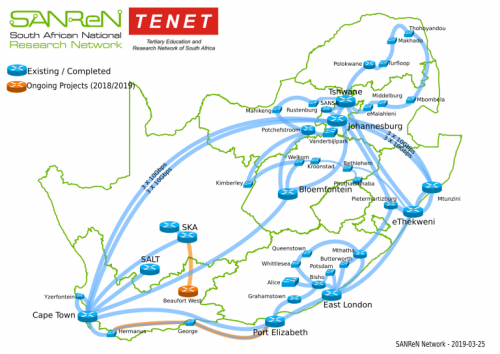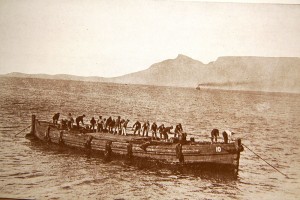[:en]
On 19 March campus practically came to a standstill when our internet service provider TENET experienced problems due to load-shedding. The issue stemmed from a failed generator at UCT and many students and staff were confused as to why we were impacted by something that happened at UCT.
What is TENET?
“TENET” is the short name for the Tertiary Education and Research Network of South Africa NPC. Its main purpose is to secure, for the benefit of South African universities and associated research and support institutions, Internet and Information Technology services.
All public universities and science councils qualify to participate in TENET’s governance as members and currently, TENET provides Internet and related services to more than 300 campuses of 85 institutions. These campuses are connected via high-speed access circuits, and multiple smaller sites via ADSL lines and a shared connection between Telkom’s ADSL network and the TENET gateway in Johannesburg.
The core of the NREN network that TENET operates is the South African National Research Network (“SANReN”) that has been deployed over the past ten years by the Meraka Institute of the CSIR under contract to the Department of Science and Technology (DST). SANReN comprises a national backbone, multiple metropolitan rings, and extensive long-haul circuits to reach important research installations. (More detail on the metropolitan rings and also the Cape Town metropolitan ring in particular.)
For international connectivity TENET uses multiple submarine circuits:
60 Gb/s on the SEACOM submarine cable that terminates at the SEACOM Landing Station at Mtunzini (and is extended from there redundantly to the SANReN backbone node at Durban), and at TENET router in Amsterdam; and
50 Gb/s on the WACS submarine cable that terminates at the SANReN backbone node in Cape Town and at TENET’s router at Telecity, London.
If you are interested in the bigger picture and want to know what South Africa’s Internet actually looks like, MyBroadband has a handy and detailed explanation.
[SOURCE: www.tenet. ac.za]
[:af]
Op 19 Maart het ons kampus amper tot stilstand gekom toe ons diensverskaffer, TENET, probleme ondervind het weens ʼn kragonderbreking. Die probleem is veroorsaak deur ʼn foutiewe kragopwekker by die Universiteit van Kaapstad. Studente en personeel wou weet hoekom dit ons internet beïnvloed het.
Wat is TENET?
“TENET” is die afkorting vir die Tertiary Education and Research Network of South Africa NPC. Sy hoofdoel is om Internet en Informasietegnologiedienste te bewerkstelling wat tot voordeel strek van Suid-Afrikaanse universiteite en geaffilieerde navorsings en ondersteuningsinstansies. Alle openbare universiteite en wetenskaplike rade kwalifiseer om lid van TENET-lede te wees.
Tans verskaf TENET Internet en verwante dienste aan meer as 385 kampusse en kleiner instellings.
Die kern van die NREN-netwerk wat deur TENET bedryf word is die South African National Research Network (“SANReN”) en is die afgelope tien jaar ontplooi deur die Meraka Instituut van die WNNR onder kontrak van die Departement van Wetenskap en Tegnologie. SANReN bestaan uit ʼn nasionale gemeenskaplike dienskanaal, veelvoudige stedelike ringnetwerke en uitgebreide langafstand koppelings om belangrike navorsingsinrigtings te bereik. (Meer detail oor die stedelike ringnetwerk en meer spesifiek die Kaapstad stedelike ringnetwerk)
Vir internasionale verbindings gebruik TENET verskeie ondersee-kabelverbindings:
60 Gb/s op die SEACOM ondersee-kabel wat eindig by die SEACOM landingstasie by Mtunzini (verleng na die oorvloei-dienskanaal in Durban) en ʼn TENET roeteerder in Amsterdam; en
50 Gb/s op die WACS ondersee-kabel wat eindig by die SANReN dienskanaalnodus in Kaapstad en TENET se roeteerder by Telecity in Londen.
As jy geïnteresseerd is in die groter prentjie en wil weet hoe Suid-Afrika se Internet werk, MyBroadband het ʼn handige den gedetailleerde uiteensetting.
[BRON: www.tenet. ac.za]
[:]




 Thanks to the University’s collaboration with SANREN and the implementation of the new Fortigate firewall, users on campus can now look forward to lower internet rates and faster, more stable internet. Both these projects were necessary if one takes into consideration that the university’s bandwidth usage doubled each year for the past 8 years. In spite of the increase in usage, rates were never increased.
Thanks to the University’s collaboration with SANREN and the implementation of the new Fortigate firewall, users on campus can now look forward to lower internet rates and faster, more stable internet. Both these projects were necessary if one takes into consideration that the university’s bandwidth usage doubled each year for the past 8 years. In spite of the increase in usage, rates were never increased.